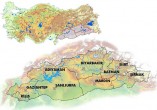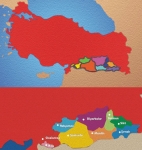What is GAP?

The project area covers 9 provinces (Adıyaman, Batman, Diyarbakır, Gaziantep, Kilis, Mardin, Siirt, Şanlıurfa, Şırnak) taking place in Euphrates-Tigris Basin and Mesopotamia plains. The surface area and population size of the provinces included in GAP consist of approximately 10% rate of Turkey. The main goals of the GAP are to increase income level of the local people and life standards by using the resources they own, to split the difference between this Region and other regions, to contribute to the economic development and social stability targets at national level by increasing the productivity and the employment in rural area.
 In 1970s, the GAP was taken as a programme based on the development of water and land resources and it was planned to construct 22 dams, 19 hydraulic power plants and and irrigation networks for an area of approximately 1.8 million hectares for irrigation and hydraulic energy production in Euphrates-Tigris Basin. It was envisaged that the total installed power of energy plants of the Project would be 7476 MW and the energy production would be 27 billion kilowatt-hours per year.
In 1970s, the GAP was taken as a programme based on the development of water and land resources and it was planned to construct 22 dams, 19 hydraulic power plants and and irrigation networks for an area of approximately 1.8 million hectares for irrigation and hydraulic energy production in Euphrates-Tigris Basin. It was envisaged that the total installed power of energy plants of the Project would be 7476 MW and the energy production would be 27 billion kilowatt-hours per year.
With the Master Plan prepared in 1989, the GAP was transformed into a regional development project including agriculture, industry, transportation, education, heath, rural and urban infrastructure investments as well. The Project is based on sustainable humanitarian philosophy aiming at creating an environment in which the next generations could improve themselves; in this development the fundamental strategies of GAP are justice, participation, environmental protection, employment, spatial planning, infrastructure development, participation of public-private sectors and citizens to the investments.
Implemented as an integrated regional development project based on multi-sector, sustainable humanitarian development and aiming at increasing the competitive force of the Region, strengthening economic and social integration, the GAP has been planned with a visionary perspective including innovative approaches when considering the period it was prepared.




